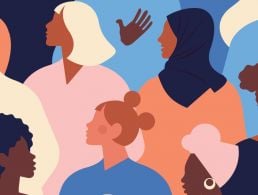Ahead of our LinkedIn Live event with Hays on 27 September, Ann O’Dea spoke to panellist Joanne Dolan, co-founder of non-profit organisation Teen-Turn.
Joanne Dolan is co-founder of Teen-Turn, an award-winning Irish charity that promotes third-level progression in STEM to teen girls from underserved and underrepresented communities.
“We do that by providing free learning sessions, opportunities, activities, exposure to role models from the time the girls are about 14 or 15 years of age. And then we stay with them, as we say, from junior cert to job,” Dolan tells me ahead of her appearance at our LinkedIn Live event on 27 September, Technology Matters: How is the inclusion movement faring?
“What distinguishes our approach is that we don’t have this wide breadth, it’s not thousands and thousands of girls. We work with a much smaller group, but there’s depth. We stay with them, and we provide them that science capital and those introductions when they’re in secondary, and then we provide them social capital when they’re in third level.”
In that way, Dolan and Teen-Turn are trying to not only support the young women in the process of getting into third-level education, but by ensuring they stay there, avoiding that often precipitous drop-out rate once they reach third level.
Of course, it’s also about helping its members to build a new network, so that this qualification then leads to a job opportunity and meaningful employment, which is of “paramount importance” to the entire process, says Dolan.
Like fellow event panellist Anne-Marie Imafidon, Dolan emphasises that this is not about pushing young women into STEM.
“There are many girls in our programming who will go on to other subjects, but it’s about gaining those qualifications, post-secondary, whether it’s a four-year honours degree or it’s an 18-month IT course, that will lead them to that meaningful employment.”
The idea came about over a glass of wine with Dolan’s friend Niambh Scullion, who had co-founded Coder Dojo Girls and was working at IBM Watson at the time. “The two of us were blue-collar kids and, as much as we were enthused by what we were seeing at things like Girls Hack Ireland and CoderDojo Girls, we felt we were somewhat preaching to the converted.”
‘We still have broadband blackspots in Ireland, which is astonishing in 2022’
– JOANNE DOLAN
While both were heartened to see young women expressing an interest in programming, they didn’t see the diversity of background they hoped for. “We just didn’t see our younger selves, or indeed much diversity at all in the room,” she says.
“And there had to be a way to make that possible, right? That’s where it all began.” In the intervening years, hundreds of girls have gone through Teen-Turn, many to remarkable success.
Given its constituency, the pandemic really saw the digital divide come to the fore for Teen-Turn. “It really became evident when everything was shut down and the only means to access education was online, if at all,” she says.
“While the schools pivoted quickly enough, many of the cohort with whom we worked actually did not have the access. They either had only mobile devices, or they didn’t own their own devices. It really brought to the fore the importance of owning your own device for educational purposes.”
Not only did Teen-Turn have to bring its entire programme online, but there had to be a mobilisation in order to get the right equipment and devices to those children who wouldn’t have had them and even get internet to those who didn’t have that.
Companies were approached for laptops, sessions were reconfigured for online, new mentors were recruited to run programmes virtually, all to great success. But this was not without its challenges.
“We still have broadband blackspots in Ireland, which is astonishing in 2022, so we had to almost run a correspondence course for some (materials were mailed out on USB sticks where necessary) in order for young girls in rural areas to still participate in the knowledge economy and the digital world during the pandemic,” says Dolan.
Flooding the talent pipeline
As people get together again, one benefit that has arisen is that Teen-Turn now offers a truly hybrid model, where cohorts can access programmes through a mix of online sessions and live get-togethers in regional hubs from Cork to Dublin to Limerick. “The online side has, if anything, allowed us to recruit busy, senior mentors we might never have reached,” says Dolan.
She describes her ultimate goal as being to “flood the talent pipeline” in Ireland with skilled, supported young women from diverse backgrounds, so that they might ultimately change the dynamic in this sector.
“If we change the people in the room, that’s success, so that’s my ambition,” she says. “Just to get to a point where they gain ground in these spaces and make it their own. And then of course they bring the young girls along with them that are coming up behind.
“So that’s the big aim, to change who’s in the room,” Dolan concludes. And there’s no doubt Teen-Turn is doing that.
On 27 September, Silicon Republic is teaming up with Hays for a LinkedIn Live. I will chair a panel that includes Dolan, as well as Imafidon, founder of Stemettes, and Rhea See, co-founder of She Loves Tech.
So have we seen enough change in the industry? Dolan says no, but she is heartened by the growing movement for change in our industries. “Diversity and inclusion can’t be a mandate. That doesn’t work. It has to be a movement,” she says.
“What keeps me optimistic is that there is a movement happening, that there are more people in the space trying to create this movement, but are we done? We’re not even close. We’re really only starting.”
Join us for our LinkedIn Live with Hays on 27 September at 12pm UTC.
10 things you need to know direct to your inbox every weekday. Sign up for the Daily Brief, Silicon Republic’s digest of essential sci-tech news.




